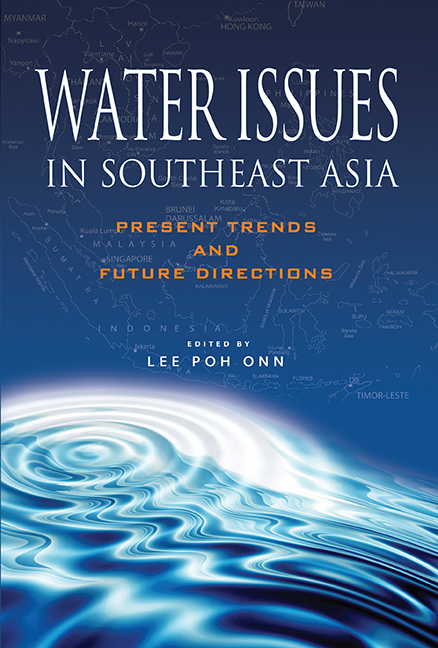Book contents
- Frontmatter
- Contents
- List of Tables, Figures, Boxes and Photos
- Acknowledgements
- About the Contributors
- CHAPTER 1 Introduction
- CHAPTER 2 China and the Potential for Conflict over Water among Eurasian States
- CHAPTER 3 River Basin Agreements as Facilitators of Development
- CHAPTER 4 Privatization of Water Services via Public-Private Partnership and Implications for Southeast Asia
- CHAPTER 5 Indonesia's Water Management Reform
- CHAPTER 6 Water Resource Management Issues in Malaysia
- CHAPTER 7 Privatization Issues in Water Supply in Malaysia
- CHAPTER 8 Troubled Waters: Rehabilitating the Pasig River, the Philippines
- CHAPTER 9 The Privatization of Water Services in Metro Manila: Lessons from a Mixed Outcome
- CHAPTER 10 Singapore's Experience in Water Resource Management
- CHAPTER 11 Thailand's Water Sector: Overview and Implications
- CHAPTER 12 Water Resources and Issues Concerning Sustainable Watershed Management Practices in Vietnam
- Index
CHAPTER 9 - The Privatization of Water Services in Metro Manila: Lessons from a Mixed Outcome
Published online by Cambridge University Press: 21 October 2015
- Frontmatter
- Contents
- List of Tables, Figures, Boxes and Photos
- Acknowledgements
- About the Contributors
- CHAPTER 1 Introduction
- CHAPTER 2 China and the Potential for Conflict over Water among Eurasian States
- CHAPTER 3 River Basin Agreements as Facilitators of Development
- CHAPTER 4 Privatization of Water Services via Public-Private Partnership and Implications for Southeast Asia
- CHAPTER 5 Indonesia's Water Management Reform
- CHAPTER 6 Water Resource Management Issues in Malaysia
- CHAPTER 7 Privatization Issues in Water Supply in Malaysia
- CHAPTER 8 Troubled Waters: Rehabilitating the Pasig River, the Philippines
- CHAPTER 9 The Privatization of Water Services in Metro Manila: Lessons from a Mixed Outcome
- CHAPTER 10 Singapore's Experience in Water Resource Management
- CHAPTER 11 Thailand's Water Sector: Overview and Implications
- CHAPTER 12 Water Resources and Issues Concerning Sustainable Watershed Management Practices in Vietnam
- Index
Summary
INTRODUCTION
Among developing countries, the Philippines has been in the forefront of privatizing its urban water systems. The Metro Manila Water and Sewerage System (MWSS) was privatized in 1997 as a concession covering water and sanitation services. The concession was split into two, covering a twenty-five-year period, and awarded on the basis of an international bidding procedure that was recognised as open and transparent, and declared the biggest water privatization in the world during the time. The contract was divided with the hope that doing so would facilitate the work of the regulator in introducing benchmarking and quasi-competition.
This chapter examines the experience of water privatization in the Philippines, focusing on the case of Metro Manila where water and sewerage services were privatized in 1997. A new and all Filipino partnership of DM Consunji Holdings Incorporated and Metro Pacific Investments Corporation (DMCI-MPIC) took over the management of Maynilad Water Services in 2007. However, the outcome of this takeover is still uncertain and as such, will not be discussed in this chapter.
Most countries that have privatized water provision have experienced a series of problems and, in some cases, have been classified as failures. However, the experience of privatization in Manila, with one well-performing and one unsuccessful concessionaire, offers valuable insights into what enables successful water privatization.
To this end, this chapter examines the issue of water privatization in five parts. The first section presents the arguments for and against privatization and identifies the proponents of each alternative. The second section looks at water provision before privatization in Metro Manila. The third section considers the privatization process, while the fourth looks into the outcomes of privatization thus far. The conclusion sums up the evidence and formulates lessons that can be drawn from the Metro Manila experience.
PROS AND CONS OF WATER PRIVATIZATION
In 2002, the UN Committee on Economic, Social and Cultural Rights released a General Comment on the Right to Water, declaring that access to sufficient, safe, physically accessible, and affordable water for personal and domestic use is a basic human right.
- Type
- Chapter
- Information
- Water Issues in Southeast AsiaPresent Trends and Future Direction, pp. 212 - 242Publisher: ISEAS–Yusof Ishak InstitutePrint publication year: 2012

